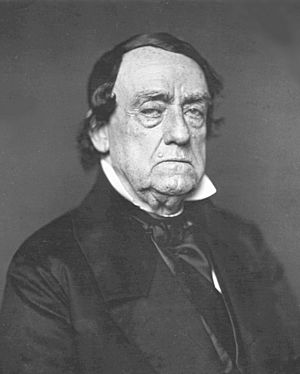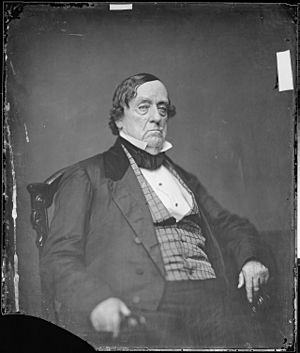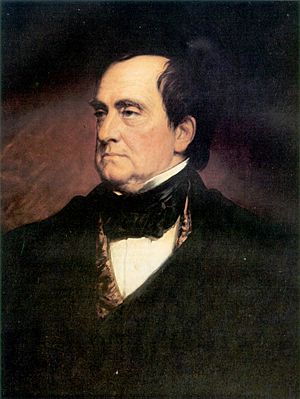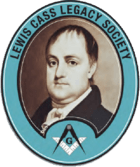Lewis Cass facts for kids
Quick facts for kids
Lewis Cass
|
|
|---|---|

Secretary Lewis Cass, c. 1855
|
|
| 22nd United States Secretary of State | |
| In office March 6, 1857 – December 14, 1860 |
|
| President | James Buchanan |
| Preceded by | William Marcy |
| Succeeded by | Jeremiah Black |
| President pro tempore of the United States Senate | |
| In office December 4, 1854 – December 5, 1854 |
|
| Preceded by | David Atchison |
| Succeeded by | Jesse Bright |
| United States Senator from Michigan |
|
| In office March 4, 1849 – March 3, 1857 |
|
| Preceded by | Thomas Fitzgerald |
| Succeeded by | Zachariah Chandler |
| In office March 4, 1845 – May 29, 1848 |
|
| Preceded by | Augustus Porter |
| Succeeded by | Thomas Fitzgerald |
| United States Ambassador to France | |
| In office December 1, 1836 – November 12, 1842 |
|
| President | Andrew Jackson Martin Van Buren William Henry Harrison John Tyler |
| Preceded by | Edward Livingston |
| Succeeded by | William King |
| 14th United States Secretary of War | |
| In office August 1, 1831 – October 4, 1836 |
|
| President | Andrew Jackson |
| Preceded by | Roger B. Taney (Acting) |
| Succeeded by | Joel Poinsett |
| 2nd Governor of the Michigan Territory | |
| In office October 13, 1813 – August 1, 1831 |
|
| Appointed by | James Madison |
| Preceded by | William Hull |
| Succeeded by | George Porter |
| Member of the Ohio House of Representatives | |
| In office 1806–1807 |
|
| Personal details | |
| Born | October 9, 1782 Exeter, New Hampshire, U.S. |
| Died | June 17, 1866 (aged 83) Detroit, Michigan, U.S. |
| Political party | Democratic |
| Spouses |
Eliza Spencer
(m. 1806; died 1853) |
| Children | 7 |
| Signature | |
| Military service | |
| Allegiance | |
| Branch/service | |
| Years of service | 1812–1814 |
| Rank | Brigadier General |
| Battles/wars | War of 1812 |
Lewis Cass (October 9, 1782 – June 17, 1866) was an important American military officer and politician. He served as a United States Senator for Michigan. He also worked in the Cabinets of two U.S. Presidents, Andrew Jackson and James Buchanan. In 1848, he was the Democratic candidate for president.
Cass owned slaves. He was a strong supporter of "popular sovereignty." This idea meant that people in each U.S. territory should decide if slavery would be allowed there.
Born in Exeter, New Hampshire, Cass studied law and became a lawyer in Zanesville, Ohio. He served in the Ohio House of Representatives and as a U.S. Marshal. Cass was also a Freemason and helped start the Grand Lodge of Michigan. He fought in the War of 1812 and became governor of the Michigan Territory in 1813. As governor, he made agreements with Native Americans to open land for American settlers. He also led an expedition to explore the northwest part of the territory.
In 1831, Cass became Secretary of War under President Andrew Jackson. In this role, he helped carry out Jackson's policy of moving Native American tribes. After serving as ambassador to France from 1836 to 1842, he tried to become president in 1844 but did not get the nomination.
In 1845, Cass was elected to the Senate. His support for popular sovereignty caused a split in the Democratic Party when he ran for president in 1848. Many anti-slavery Democrats joined the Free Soil Party, which may have helped Whig candidate Zachary Taylor win. Cass returned to the Senate in 1849. In 1857, he became Secretary of State under President James Buchanan. He resigned in 1860 because he disagreed with Buchanan's actions regarding the Southern states threatening to leave the Union.
Early Life and Career Beginnings
Growing Up in New Hampshire and Ohio
Lewis Cass was born on October 9, 1782, in Exeter, New Hampshire. This was near the end of the American Revolution. His parents were Molly Cass and Major Jonathan Cass. His father was a veteran of the Revolutionary War.
Cass attended the private Phillips Exeter Academy. In 1800, his family moved to Marietta, Ohio. Many people were moving west after the war. Cass studied law and became a lawyer in Zanesville.
Early Political Roles
In 1806, Cass was elected to the Ohio House of Representatives. The next year, President Thomas Jefferson appointed him as the U.S. Marshal for Ohio.
Cass also joined the Freemasons. This was a popular social group at the time. He helped start the Grand Lodge of Ohio. He also served as the Grand Master of the Ohio Freemasons.
Lewis Cass and the War of 1812
When the War of 1812 started against the United Kingdom, Lewis Cass became a military leader. He commanded the 3rd Ohio Volunteer Regiment.
Early Battles in Canada
In July 1812, Cass led troops in Canada. He was involved in several small fights near Fort Malden. In one fight, American troops under Cass and James Miller surprised British and Native American forces. They caused some casualties but had to retreat because their commander, General Hull, was not supportive.
Later, Cass and other American forces captured two British soldiers near the fort. They safely returned with their prisoners. Cass also led a quick attack at the Rivière aux Canards, pushing back Native American fighters.
Promotions and the Battle of the Thames
Cass became a colonel in the U.S. Army in February 1813. Soon after, he was promoted to brigadier general. He fought in the Battle of the Thames. This was a major victory for the Americans against British and Native American forces. Cass left the Army in May 1814.
Governor of Michigan Territory
After his military service, President James Madison appointed Cass as Governor of the Michigan Territory. He served in this role from 1813 to 1831. During his time as governor, Cass often traveled for work. Other officials would act as governor in his place.
Treaties with Native American Tribes
Cass played a key role in making agreements with Native American tribes in Michigan. These agreements allowed the tribes to give up large amounts of their land. This opened up areas of Michigan for settlement by European Americans. Some tribes were given small areas of land to live on within the territory.
In 1817, Cass helped negotiate the Treaty of Fort Meigs. This treaty was signed with several Native American tribes. It led to the United States gaining a lot of land.
Exploring the Michigan Territory
In 1820, Cass led an expedition to the northwestern part of Michigan Territory. This area is now northern Minnesota. The goal was to map the region and find the source of the Mississippi River. At that time, no one knew where the great river began.
The Cass expedition mistakenly identified Cass Lake as the source. It was not until 1832 that another explorer, Henry Rowe Schoolcraft, found the true source, Lake Itasca.
Secretary of War and Indian Removal
In 1830, Lewis Cass wrote an article arguing that Native Americans should be moved from the eastern United States. This article impressed President Andrew Jackson.
On August 1, 1831, Cass resigned as governor of Michigan Territory. He became Secretary of War under President Andrew Jackson. He held this job until 1836.
As Secretary of War, Cass was very important in carrying out Jackson's policy of Indian removal. The Indian Removal Act had passed in 1830. This policy mainly affected tribes in the Southeast, but also tribes in Ohio and Illinois. Most tribes were forced to move to Indian Territory, which is now parts of Kansas and Oklahoma. However, some groups were able to stay in Michigan.
U.S. Minister to France
After his time as Secretary of War, President Jackson appointed Cass as the U.S. Ambassador to France. He started this role on December 1, 1836. He served until November 12, 1842. He was followed by William R. King, who later became Vice President.
Presidential Goals and the U.S. Senate
Seeking the Presidency
In 1844, Cass tried to get the Democratic Party's nomination for president. He did not win, and James K. Polk was chosen instead.
In 1845, the Michigan state legislature elected Cass to the United States Senate. He served there until 1848.
In 1848, he resigned from the Senate to run for president. His running mate was William Orlando Butler. Cass strongly supported "popular sovereignty." This idea meant that people living in a U.S. territory should decide if slavery would be allowed there.
His support for this idea caused a split in the Democratic Party. Many anti-slavery Democrats in the North joined the Free Soil Party. This party nominated former President Martin Van Buren. Cass lost the election to Zachary Taylor.
Return to the Senate
After losing the election, Cass was elected back to the Senate by the Michigan legislature. He served from 1849 to 1857. He was the first Democratic presidential candidate to lose an election after another Democrat had been president.
Cass tried again to become president in 1852. However, he and other candidates like James Buchanan and Stephen Douglas could not get enough votes at the Democratic Convention. The party then chose Franklin Pierce as their candidate.
U.S. Secretary of State
On March 6, 1857, President James Buchanan appointed Lewis Cass as Secretary of State. This was a way to reward Cass for his many years of service and his past presidential campaigns. Cass was 75 years old at the time. Many people thought he was too old for such a demanding job.
Cass accepted the position right away. He promised not to make anti-British comments in public. He had fought in the War of 1812 and had a low opinion of Britain. Most people thought Cass would only be Secretary of State for a short time. However, he served for almost all of Buchanan's presidency. Cass often let his assistants handle major decisions, but he was happy to sign official papers.
Cass was sympathetic to American "filibusters" in Central America. These were people who organized private military actions against other countries. He helped remove Commodore Hiram Paulding from his command for landing Marines in Nicaragua. He also helped send William Walker back to the United States.
Cass tried to buy more land from Mexico, but Mexico and U.S. lawmakers opposed it. He also helped settle the Clayton–Bulwer Treaty. This treaty limited U.S. and British control over countries in Latin America.
Cass resigned on December 14, 1860. He disagreed with President Buchanan's handling of the Southern states. He felt Buchanan did not do enough to protect federal interests or use the military to prevent the Southern states from threatening to leave the Union.
Personal Life and Family
On May 26, 1806, Lewis Cass married Elizabeth Spencer (1786–1853). Her grandfather, Joseph Spencer, was a major general in the Continental Army. Lewis and Elizabeth had seven children. Five of them lived past infancy:
- Isabella Cass (1805–1879), who married a Dutch diplomat.
- Elizabeth Selden Cass (1812–1832).
- Lewis Cass Jr. (1814–1878), who was an army officer and a U.S. diplomat.
- Mary Sophia Cass (1812–1882), who married an Army officer.
- Matilda Frances Cass (1818–1898), who married Henry Ledyard, the mayor of Detroit.
- Ellen Cass (1821–1824), who died young.
- Spencer Cass (1828-1828), who died as a baby.
Lewis Cass passed away on June 17, 1866, in Detroit, Michigan. He is buried in Elmwood Cemetery in Detroit.
Family Legacy
Through his daughter Mary, Lewis Cass was the great-grandfather of Cass Canfield. Cass Canfield was a longtime president and chairman of a major publishing company.
Through his daughter Matilda, he was the grandfather of several notable people. These included Henry Brockholst Ledyard Jr., who was president of the Michigan Central Railroad, and Lewis Cass Ledyard, a famous lawyer.
Cass's great-great grandson, Thomas Cass Ballenger, served in the U.S. Congress for North Carolina from 1986 to 2005.
Commemoration and Legacy
Lewis Cass has been honored in many ways:
- A statue of Cass is in the National Statuary Hall collection in the U.S. Capitol in Washington, D.C.. It was given by Michigan.
- A Liberty ship from World War II was named the SS Lewis Cass.
- Many places are named after him, including the village of Casstown, Ohio, the community of Cassville, West Virginia, and Cassopolis, Michigan.
- Several counties in different states are named after him, such as Indiana, Iowa, and Michigan.
- Streets in cities like Detroit, Milwaukee, and Green Bay are named Cass Avenue or Cass Street.
- Several schools are named in his honor, including Cass Technical High School in Detroit.
- The Lewis Cass Legacy Society supports the Michigan Masonic Charitable Foundation, recognizing his support for Freemasonry.
See also
 In Spanish: Lewis Cass para niños
In Spanish: Lewis Cass para niños




